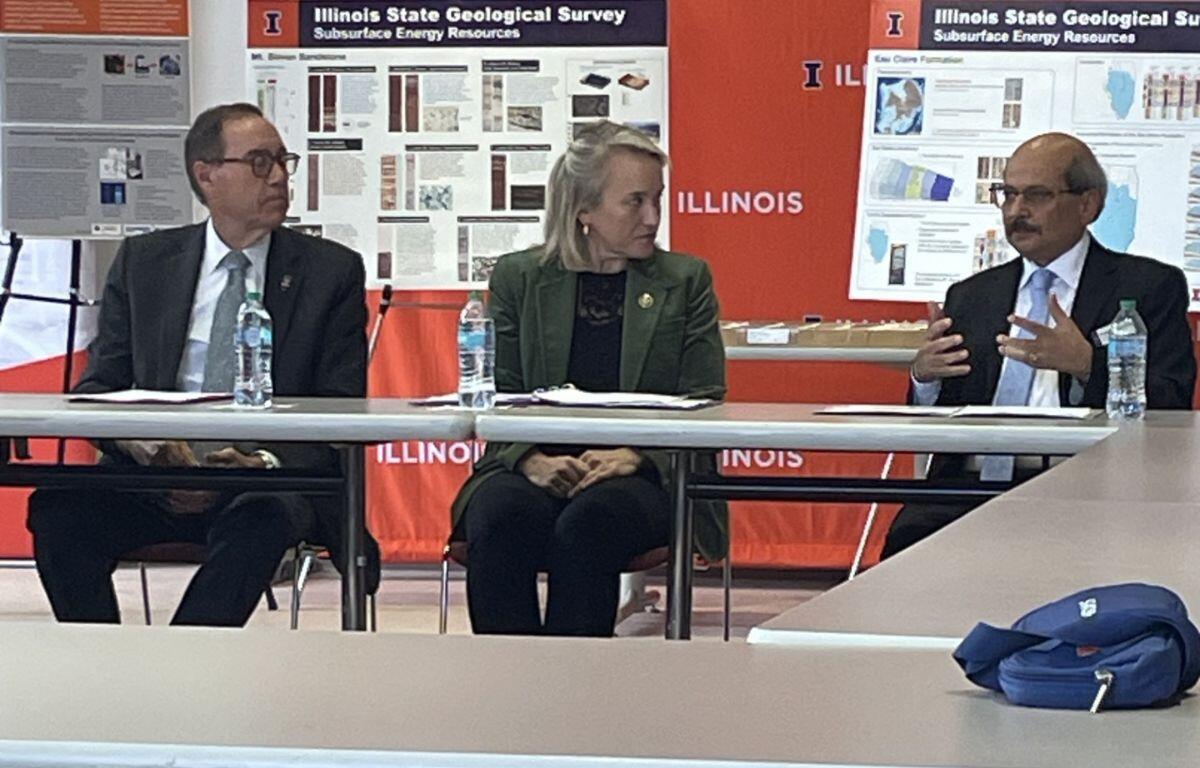CHAMPAIGN, IL (Chambana Today) — U.S. Representative Nikki Budzinski (D-Springfield) visited the University of Illinois’ Prairie Research Institute (PRI) on Tuesday to meet with researchers and discuss the abrupt cancellation of more than $23 million in federal grant funding — a move she denounced as politically motivated retaliation by the Trump administration.
The U.S. Department of Energy announced on October 2 that it was terminating grants associated with several environmental and energy research projects, citing lack of economic viability and national interest. But PRI leaders say the cuts blindsided them and had nothing to do with project performance.
“This is unprecedented,” said Budzinski. “The projects I toured today would have tackled critical public health challenges — improving access to clean water, reducing carbon emissions, and responsibly sourcing critical minerals. Instead, politics is being chosen over people.”
The grants, previously approved by Congress, were terminated amid the ongoing federal government shutdown. PRI’s Executive Director Praveen Kumar said the decision impacts major research efforts and potentially dozens of jobs at the institute.
“There’s a real lost opportunity here that we’re not going to get back,” Budzinski added. “These were good-paying, future-focused jobs. These were projects that protected public health and strengthened national security.”
Jobs, Research, and Momentum Lost
The cancellations affect 86 employees across a mix of full-time and part-time roles. Projects targeted include carbon sequestration, direct air capture, and critical minerals recovery from coal ash ponds — all previously funded through the U.S. Department of Energy.
Among the cancelled grants:
-
$15.2 million for the Illinois Basin West CarbonSAFE Phase III project, which aimed to permanently store 50 million metric tons of carbon dioxide near Springfield’s Dallman 4 power plant.
-
$6.8 million for Direct Air Capture Hubs, which were to remove carbon dioxide directly from the atmosphere for use in new materials and products.
-
$1.36 million for research into recovering critical minerals from coal combustion waste in Illinois and Ohio.
-
$180,000 for a project examining the impacts of solar energy development on pollinator species.
PRI officials say termination letters gave little explanation — only that the projects had been cancelled. “This was not performance-based,” Kumar said. “We received no indication that these projects weren’t meeting expectations. In fact, many were already producing promising results.”
Kevin O’Brien, Director of the Illinois Sustainable Technology Center (part of PRI), warned of long-term consequences beyond the immediate loss of funding. O’Brien said. “When you pull funding midstream, you not only disrupt communities that are counting on this work, you scare away private-sector partners who were prepared to invest.”
Political Retaliation Alleged
Democrats on the House Appropriations Committee argue the cuts were politically targeted. The 136 affected congressional districts include 108 represented by Democrats, and most of the projects were located in 16 Democratic-led states.
The cuts followed a social media post by Office of Management and Budget Director Russ Vought, who wrote: “Nearly $8 billion in Green New Scam funding to fuel the Left’s climate agenda is being cancelled.”
Budzinski says this messaging leaves little doubt about the administration’s motivation. “It’s clear this was retaliation against Democratic lawmakers for standing up for Americans’ healthcare during the shutdown,” Budzinski said. “This wasn’t about fiscal responsibility. It was about silencing science and punishing progress.”
DOE officials said affected award recipients have 30 days to appeal the terminations. Kumar said the university will pursue all available options, but warned that damage has already been done. “We are trying to figure out how to manage this crisis,” he said. “We may be forced to lose people we can’t afford to lose — people whose expertise we need now more than ever.”


